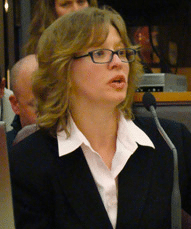Vivian Krause has spent years scrutinizing how Canadian environmental groups are funded, claiming she’s just asking “fair questions.”
But as the blogger-turned-newspaper-columnist has run rampant with her conspiracy theory that American charitable foundations’ support of Canadian environmental groups is nefarious, she has continually avoided seeking a fair answer.
If Krause were seeking a fair answer, she’d quickly learn that both investment dollars and philanthropic dollars cross borders all the time. There isn’t anything special or surprising about environmental groups receiving funding from U.S. foundations that share their goals — especially when the increasingly global nature of environmental challenges, particularly climate change, is taken into consideration.
Despite this common-sense answer, Krause’s strategy has effectively diverted attention away from genuine debate of environmental issues, while simultaneously undermining the important role environmental groups play in Canadian society.
Creating Diversions a Trademark of Oil Industry Strategy
This diversion strategy is a well-known tactic of the oil industry. A strategy document leaked yesterday details how one of the world’s most powerful PR firms, Edelman, advised TransCanada to undermine opponents to the Energy East pipeline.
Edelman recommended TransCanada apply pressure to opponents by “distracting them from their mission and causing them to redirect their resources.” To achieve that, Edelman advises TransCanada to work with “supportive third parties who can in turn put the pressure on, particularly when TransCanada can’t.”
Sound familiar?
In Vivian Krause’s resume, she proudly takes credit for spawning a Senate inquiry and Canada Revenue Agency audit — distractions that forced environmental groups to spend time defending themselves, rather than doing their important work as watchdogs and advocates for environmental protection.
While Krause has been busy maligning the funding of Canadian environmental groups, very little attention has been paid to where Krause gets her bread buttered.
Krause Receives 90% of Income From Resource Industries
Krause frequently claims her research is independent (PDF) and that her work is unaffiliated with any industry — yet she has admitted that since 2012, more than 90 per cent of her income has come from oil, gas and mining interests through honorariums and speaking fees.
Krause has been paid as much as $10,000 to speak to energy executives. While she may not be directly employed by the fossil fuel industry, her work certainly aligns with that industry’s interests.
Groups paying Krause speaker’s fees included the Canadian Association of Petroleum Producers, the Canadian Energy Pipeline Association, the Atlas Economic Research Foundation, the Association for Mineral Exploration and the Vancouver Board of Trade.
Large speaking fees are increasingly being used as a handy way to support the work of industry allies without directly employing them.
To see just how contentious speaking fees can be, take a gander at the recent Rex Murphy or Peter Mansbridge controversies. CBC ended up adjusting its policy, requiring hosts to disclose their speaking fees.
What Was Vivian Krause’s Argument Again?
So let’s get this straight: Krause, who has relied on speaking fees from the multinational resource sector for 90 per cent of her income for the past three years, argues that Canada’s environmental organizations are fronts for U.S. interests because they receive a portion of their funding from across the border?
Despite the spurious logic, Krause is still given a platform to spread her misleading information in the Postmedia chain of newspapers, including the Financial Post and The Province, as well as on Global News shows where she’s a regular panelist on Unfiltered with Jill Krop.
While Krause may spin a mysterious tale, the answer is simple: philanthropic dollars crossing borders to support work on global issues is the norm. And Canadian charities are required to disclose all significant donations from foreign sources annually.
The Real Debate Canada Needs
The continued debate over the funding sources of the environmental community is simply a diversion tactic that favours the fossil fuel industry’s desire to avoid having the real debate about Canada’s energy future.
The latest report from the Intergovernmental Panel on Climate Change urges nations to phase out fossil fuels immediately to avoid the worst impacts of global warming.
The report puts responsibility squarely on the shoulders of our elected leaders, saying they can “either put policies in place to achieve this essential shift, or they can spend the rest of their careers dealing with climate disaster after climate disaster.”
But Canada won’t meet its 2020 international climate target, according to Environment Commissioner Julie Gelfand.
“The federal government does not have an overall plan that maps out how Canada will achieve this target. Canadians have not been given the details about which regulations will be developed, when, nor what greenhouse gas reductions will be expected,” Gelfand wrote in a report last month.
Now that China and the U.S. have signed a deal agreeing to cut emissions, Canada is left with even fewer excuses not to act.
Meantime, the federal government’s mandate to advance an energy superpower agenda marches forth, resulting in controversy across the country — from the Kinder Morgan fiasco on Burnaby Mountain, to the First Nations legal battle against Enbridge Northern Gateway, to the Athabasca Chipewyan and Beaver Lake Cree First Nations’ fight to prevent oilsands expansion on their territory, to efforts to ban fracking in Nova Scotia.
These efforts are not the outcome of foreign conspiracy — they’re the outcome of a lack of any sensible national conversation about how to develop our natural resources while meeting our international climate change commitments.
Subscribe to our newsletter
Stay up to date with DeSmog news and alerts







